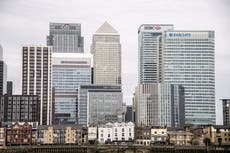Rishi Sunak refuses to end non-dom tax status claiming it would cost too much
Keir Starmer demands end to ‘tax breaks for super-rich’ at PMQs

Rishi Sunak has refused to end Britain’s controversial non-dom tax status – claiming it would cost too much money to change the rules.
Labour leader Sir Keir Starmer challenged the prime minister on the issue at PMQs – saying it could raise billions of pounds for the NHS.
“Scrapping the non-dom status would allow us to train 15,000 doctors every year,” said Sir Keir – calling for an end to “tax breaks for the super-rich”.
The Independent revealed back in April that Mr Sunak’s wife Akshata Murty enjoyed the non-dom status – later given up – which allows the wealthy to avoid UK taxes on overseas income.
Responding to Sir Keir, Mr Sunak said: “The problem with his idea is that it would end up costing Britain money,” pointing to Labour’s previous opposition to ending non-dom status in case it turned investors away.
The PM added: “Labour had 13 years to address this issue and did nothing”, accusing Sir Keir of “peddling fairy tales and gesture politics”.
Sir Keir responded: “He talks about the money, every year that’s £3.6bn thrown away because he won’t make them pay their taxes here – how many extra doctors could Britain afford with that money?”
Chancellor Jeremy Hunt revealed later on Wednesday that he has asked the Treasury to look into how much could be raised by closing the non-dom tax loophole, when asked about Labour’s claim it could raise more than £3bn per year.
Grilled by the Treasury select committee, Mr Hunt said he did not get Treasury estimates on ending the non-dom status – before arguing that he would rather non-dom beneficiaries “stayed here and spent their money here” rather than moving abroad.
Saying they paid around £8bn in tax a year, the chancellor added: “I want to make sure that wealthy foreigners pay as much tax in this country as possible.”
Mr Starmer used PMQs to press the PM on the economy. He asked why the UK faces the lowest growth of any OECD nation in the next two years – blaming the Tories for Britain being “first into a recession and the last out”.
The Labour leader also said some oil and gas firms still “haven’t paid a penny in windfall tax” due to loopholes in the levy.
Sir Keir added: “Too weak to take on his party, too weak to take on vested interests, 12 long years of Tory government, five prime ministers, seven chancellors. Why do they always clobber working people?”
Vowing to deliver growth Mr Sunak said: “If the Labour party is serious about actually supporting growth, maybe they should get on the phone with their union paymasters and tell them to call off the [rail] strikes.”
Mr Sunak also claimed he had made a positive difference to the UK economy in just four weeks, following his predecessor Liz Truss’s short-lived premiership.
“In four weeks, I have strengthened the economy, we have put more money into the NHS and schools, we have delivered a deal to tackle illegal migration,” he told the Commons.
The OECD’s latest forecasts suggests Britain will rank bottom of the growth league table for major economies for the next two years in succession.
The international body also warned that UK was vulnerable to blackouts over the coming months, warning: “A particularly cold winter could risk supply disruptions, exposing the economy to rolling power cuts.”
While Mr Sunak pointed to the fact the UK had the fastest growth in the G7 this year, Sir Keir highlighted that Britain would be at the “bottom” of the growth league for the next two years.




Join our commenting forum
Join thought-provoking conversations, follow other Independent readers and see their replies
Comments